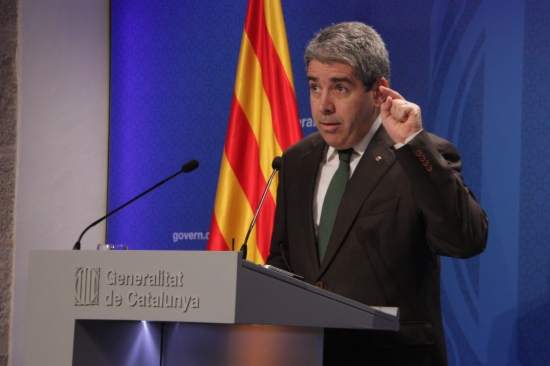02.04.2014 - 11:36
The legal services of the Catalan Government have issued a report analyzing last week’s Constitutional Court judgment on the Catalan Parliament’s Declaration of Sovereignty. The Constitutional Court rejected the idea that Catalonia was a “sovereign political and legal entity”, but at the same time it recognized that “Catalan citizens’ right to decide” fits into the Constitution. The Court rejected “the right to self-determination” but it recognized self-determination as a legitimate and therefore constitutional “political aspiration”. On top of this, the Court urged the political powers to talk and find agreements, and it pointed out that all the parts of the current Constitution can be reformed. As far as the Catalan Government is concerned, the Court backs a vote to find out the opinion of Catalan citizens as long as it is only a consultation and not a binding self-determination referendum. The Spokesperson of the Catalan Executive and Minister for the Presidency, Francesc Homs, explained the report’s main statements and noted that the Constitutional Court rejected many of the Spanish Government’s arguments against Catalonia’s self-determination process. In addition, Homs highlighted that this process is “unstoppable” and that Catalans will vote one way or the other. Finally, despite finding some positive arguments in the Constitutional Court’s judgment, Homs lamented the fact that the Court had issued a judgment at all on a political declaration with no legal effect.
On Tuesday, the Catalan Government presented a report drafted by its legal services and independent constitutional experts. The document has been coordinated by Carles Viver Pi-Sunyer, who is a former Member of the Constitutional Court and currently directs the Institute of Autonomic Studies and chairs the Catalan Government’s Advisory Council for the National Transition (CATN), a body formed of independent experts that has identified legal paths towards self-determination and analyses specific aspects related to building an independent state.
A judgment on a political declaration
First of all, the report criticizes the fact that the Constitutional Court has issued a judgment at all on what is a political declaration: the Catalan Parliament’s ‘Declaration of Sovereignty and the Right to Decide’. The Catalan Government’s report points out that the Court’s arguments for stating that the Declaration has legal effects are “weak and contradictory” since it gives the Parliament’s text “a legal nature” but at the same time “it is not possible to identify any real legal effect”. “As a Government, we are worried about the fact that a Court – despite being the Constitutional one – issues a judgment and analyzes in legal terms what is a political declaration”, stated Homs. “This extraordinary forced interpretation” of the Court’s role and the object of its analyses might become a problem in future for other political declarations and the freedom of speech, noted Homs.
Recognizing “the Catalan citizens’ right to decide”
Secondly, despite the initial considerations, the Catalan Government’s report highlights the fact that the Court recognizes “the Catalan citizens’ right to decide”. In addition, the Court stated in an explicit way that “the public powers of an Autonomous Community” can undertake activities aimed to address their political objectives, if those activities fit into the Constitutional framework. The exercise of self-determination does not fit into the Constitution according to the Court, since it goes against the “indissoluble unity of the Spanish nation”. However, the Court recognized that self-determination is a legitimate “political aspiration” that can be pursued through legal channels.
The ruling also pointed out that the Constitution can be reformed, including Article 2, which states the “indissoluble unity of the Spanish nation”, a formula that was included as a concession to the Franco Dictatorship officials and Army in order not to derail the democratization process. The same Article also states that Spain is formed by “nationalities and regions”, as a way to recognize the Basque Country’s and Catalonia’s nationhood. However, the Spanish Government and Spanish nationalists tend to forget about this part of Article 2 and only insist on the “indissoluble unity of the Spanish nation”. In fact the Spanish Court pointed out Canada’s Supreme Court judgment on Quebec’s self-determination, recognizing that Quebec people should express their will to be independent in a clear way first, and later the political powers would negotiate the Constitutional changes to make it possible.
First a consultation vote and later a constitutional reform
Therefore, combining all the previous arguments, the Catalan Government concludes that it can organize a consultation vote with the aim of finding out the opinion of Catalan citizens about their collective future. “Among the activities to address [the political aspiration of] the exercise of the right to self-determination, any consultation vote aiming to find out the citizens’ opinion can be included, if it is not a self-determination referendum,” Homs pointed out. Once this opinion is known, if Catalan citizens express the opinion that they would prefer to be independent or have their own state, political negotiations would start to reform the Constitution in order recognize the right of self-determination.
According to the Catalan Government’s report, it is possible to organize a consultation vote within the current legal framework, backed by the judgment of the Constitutional Court. In fact, Homs stated that the arguments put forward by the Constitutional Court will be very useful in defending the consultation vote agreed by a majority of Catalan parties and scheduled for the 9th of November this year. In addition, Catalan MPs will also use those arguments next week, when the Spanish Parliament debates the formal petition to transfer referendum powers to the Catalan Government using Article 150.2 of the Constitution. Homs insisted that Catalans will vote one way or the other, since the self-determination process is “unstoppable”. In this vein, he insisted that he would prefer to have a vote that has been agreed upon with the Spanish institutions.



